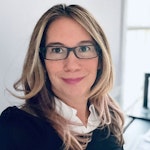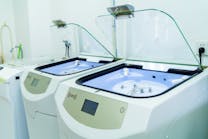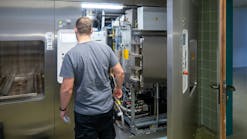Salary Survey shows CS/SPD education, certification keys to growth
Most central sterile/sterile processing department (CS/SPD) professionals are earning more money, their jobs are stable, educational opportunities are growing and certification remains a top priority, according to the results of the 2019 Healthcare Purchasing News CS/SPD Salary Survey. The average annual salary for CS/SPD professionals increased by 4 percent — from $60,663 in 2018 to $63,344 in 2019 — and the majority of respondents (58 percent) reported an increase in pay over last year.
- Educators see greatest gains: SPD Educators experienced the greatest salary gains, increasing 24 percent from $54,808 in 2018 to $67,917 in 2019. This is the second year in a row that the average annual salary for educators has jumped over 20 percent.
- CS/SPD Directors still on top: At the top of the CS/SPD career ladder, the Director position continues to report the highest average annual salary: $112,900, which was up 10 percent from 2018.
- Steady increases in pay among Surgical Instrument Techs and Lead CS/SPD Techs: Those in these two positions reported significant increases in annual pay over 2018, with Surgical Instrument Techs up 9 percent and Lead CS/SPD Techs up 6 percent.
- CS/SPD Techs/Coordinators and Managers stay static; supervisors dip: Those in Manager positions reported no increases in pay from 2018 to 2019, with Tech/Coordinators experiencing a slight dip in average annual salary, from $41,276 in 2018 down to $40,852 in 2019. Supervisors also dipped 8% from $55,291 to $51,125.
- OR Liaison income is down: The average annual salary for the OR Liaison position dropped 17 percent — from $57,500 to $47,500. This is likely a correction of a large salary leap — 32 percent — from 2017 to 2018 that resulted from higher than average education levels among OR Liaison survey respondents last year.
As in past years, level of education, facility type and geographic region all impacted average CS/SPD average salaries. Those with post-graduate degrees earn the most by far, with an average annual salary of $90,482, which is $14,744 more than those holding bachelor’s degrees, $26,425 more than those with associate’s degrees, and $37,420 more than those with high school diplomas alone.
CS/SPD professionals working in teaching hospitals reported the highest average annual salary at $74,008, followed by those in IDN/alliance/multi-group facilities at $63,227, and standalone hospitals at $60,787. Those working in long-term care and home health facilities reported the lowest average annual pay at $42,500.
The highest salaries for CS/SPD professionals are reported in urban healthcare facilities at $71,864, with the lowest salaries earned in rural facilities, at $50,829 annually. With regards to U.S. geography, CS/SPD professionals in the Pacific region earn the highest pay at $72,617 annually, as in past years, well ahead of the second highest region, the Northeast, with an average annual salary of $63,393.
A secure profession, but one with high turnover
“In-house sterile processing techs and managers very rarely lose their jobs unless it is for cause,” said Mullen. “It’s not impossible to get laid off, but it is very rare that CS/SPD would be affected. The reason why there is high turnover in the profession isn’t because of CS/SPD professionals losing their jobs, rather it is because they move on to better paying jobs in CS/SPD at other hospitals. Others use the sterile processing career ladder as a stepping stone, going back to school to become surgical techs, earn nursing degrees or pursue other higher paying career paths.”
Education, certification: Keys to climbing the career ladder
When posed with the question, “How does someone successfully climb the CS/SPD career ladder?” the survey data and insights from CS/SPD leaders point to the same answer: Through advanced education and certification.
“Easily the most effective way to climb the career ladder in sterile processing is to get certified,” said Chris Franklin CRCST, CSPDT, CSIS, CFER, Endoscopy Tech, IU Health, Board of Directors, Certification Board for Sterile Processing & Distribution (CBSPD), Owner & President, The SPD Network. “As a member of the CBSPD Board of Directors, I often preach the benefits of becoming certified and the impact it can have on a successful career in the sterile processing field. In addition to the initial tech certification, certifications in management, instrument specialist and endoscope reprocessing are also available. Not only can additional certifications aid in scaling the career ladder, but they will also advance your confidence and skill level.”
This year’s survey found certifications are holding steady, with 90 percent of those surveyed already certified (same as 2018), 4 percent in the process of becoming certified and 4 percent considering certification. There was a slight increase in respondents who said their facilities require certification of their CS/SPD staff, with 67 percent saying certification is a requirement, compared with 64 percent in 2018.
“More technicians are becoming certified and it’s more likely that if the technician is reimbursed by their employer, they will take the test,” said Mary K. Lane, MHA, CSPDM, CSPDS, CSPDT, MK Lane SPD Consulting. “Furthermore, many savvy technicians know that if they are certified, they are more likely to move up in the organization and they are more likely to get a travel assignment if they want one with the certification. In addition, technicians who are passionate about what they do are more likely to get certified and become certified in more than one area in order to move up quickly and be seen as a committed employee.”
Continuing education continues to rise
The survey results indicate that CS/SPD professionals increasingly embrace continuing education opportunities as a way to strengthen knowledge and advance their careers. This year, 82 percent of respondents said they participate in 10 or more continuing education courses/lessons each year, with 38 percent of those participating in 20 or more annually. Furthermore, employers are increasingly compensating CS/SPD professionals who go the extra mile to earn continuing education credits (CEUs). Among those surveyed, 16 percent said their hospital offers higher levels of compensation in exchange for CEUs earned.
“Education is the key to many things in the CS/SPD profession, such as salary and job security, but your average staff member doesn’t even consider it,” said Mullen. “For the first 20 years of my career I cared only about hands-on training. I didn’t recognize the importance of education until a manager sat me down and told me that I had to earn my certification in order to become a lead. I successfully passed the test and became a lead, then a supervisor just six months after becoming certified. Today I’m one of the few people who have earned all four certifications from the International Association of Healthcare Central Service Materiel Management (IAHCSMM).”
In 2018, IAHCSMM celebrated its 60th anniversary. It currently serves over 30,000 members and certificants. IAHCSMM Education Director Natalie Lind, CRCST, CHL, FCS, says the organization continually strives to meet the needs of CS/SPD professionals. Here are some of IAHCSMM’s most recent educational offerings:
- Endoscope reprocessing certification: In 2017, in response to the need for education specific to flexible endoscope reprocessing, IAHCSMM began to offer a new certification: Certified Endoscope Reprocessor (CER).
- Instrument resource manual: In 2018, IAHCSMM published an Instrument Resource Manual designed to provide real-world and detailed information for anyone who reprocesses surgical instruments.
- On-demand webinars: In 2018, IAHCSMM began offering on-demand webinars designed to meet the needs of all CS/SPD professionals. Topics are offered for new employees, experienced employees, educators and managers. At the time of this article, 17 webinars are available and new topics are added to the library regularly.
“CS/SPD is a fast-moving field and continuing education is critical for success,” said Lind. “The profession is constantly changing — new technologies, new scientific knowledge and standards, guidelines and regulations require us to work diligently to ensure we are following best practices. Our goal must be to provide the products, devices and support to enable our facilities to provide the best possible care.
“Education is good for the patient, but it is also good for all healthcare professionals, including those in the CS/SPD profession,” Lind added. “Enhancing our skills and knowledge is an important part of professionalism. We have several additional education initiatives in the works for 2019, and the IAHCSMM Education Department continues to keep existing education systems current and develop new and innovative offerings.”
Lane points out how some CS/SPD professionals do not pursue continuing education or allow their certifications to lapse because their employers will not cover the cost and they can’t afford to pay out of pocket for the required courses. She notes how many suppliers are now offering CEUs for sterile processing professionals online at no cost, which helps fill this gap.
“I always encourage CS/SPD staff to seek out as many learning opportunities as they can and to ask questions,” said Lane. “I also encourage staff to attend as many educational seminars as they can afford to attend because there is a wealth of information to be gained and shared. Finally, I encourage staff to get certified in as many areas as they can because it shows their dedication to the profession and wanting to grow and move up. Once the employees feel comfortable in their role and with their knowledge base I encourage them to join IAHCSMM and any other organizations that are related to CS/SPD.”
Michele DeMeo, CSPDT, CRCST, Independent CS/SPD Consultant at MDD Virtual Consulting, notes how countless CS/SPD technicians have told her they feel “stuck” and have no chance of advancing. She says nothing can be further from the truth, explaining how nearly everyone has the same opportunity to advance. She stresses the importance of continuing education and commitment to the profession, offering the following advice to CS/SPD professionals:
- Expand your learning: Continue to learn every aspect and advance in not only CS/SPD, but also surgical services, infection control, risk management, quality control, environmental science, human factoring, engineering and best practice standards across as many healthcare sectors as possible as CS/SPD intersects all of these.
- Extend your reach: DeMeo recommends asking to take on additional responsibilities without asking for more pay. She says a CS/SPD professional must earn his or her ability to advance, and pay increases will come as a natural byproduct of increased responsibility.
- Take the high road: Personal integrity is paramount. DeMeo urges CS/SPD professionals to never “badmouth” leadership or their peers. “While you will likely never agree with all of leadership’s decisions, remember you aren’t always told the entire story or set of circumstances that let to a decision.”
Higher education: Nurturing the next generation of leaders
While continuing education opportunities for CS/SPD professionals are growing, there is still much work to be done around higher education opportunities for the profession. The highest education level for nearly half of survey respondents (47%) is a high school diploma, with another 43 percent holding associate’s or bachelor’s degrees, and only 10 percent having earned post-graduate degrees.
Mullen, who is both a manager of sterile processing and runs a sterile processing school, says that while most education facilities have a small program to teach sterile processing, they tend to focus their efforts more on surgical techs, nursing and other more lucrative programs. But he adds that this is changing as more schools focused primarily on sterile processing are “popping up” across the country.
In order for these programs to succeed, and for graduates to have the knowledge and skills they need to succeed in the CS/SPD profession, Mullen believes there must be a fundamental shift in how educators teach sterile processing — moving beyond theory to critical thinking. He states:
“Unfortunately, we have been in a rut for over 100 years. The current programs, although they teach theory behind microbiology, sterilization, cleaning and the importance of it, there is really nothing in there with regards to critical thinking. This is opposed to nursing programs where the nurses throughout their education are encouraged to stretch their imaginations. We must do the same in our profession and encourage individuals to not only embrace critical thinking but also promote it among others in their departments.”
Lane says many healthcare organizations struggle to find CS/SPD leaders who have both higher levels of education and hands-on experience in the profession. She explains that as sterile processing grows in recognition and importance within the overall context of healthcare and patient safety, CS/SPD leaders must grow in their roles as well.
“We typically focus on technicians and their roles in the department and overlook the leadership roles in CS/SPD but these are actually the areas that most healthcare facilities are struggling with,” said Lane. “In the past, the leadership roles were filled by anyone who would take the job or by someone that had longevity with the organization, which is no longer going to ‘fit the bill.’ Gone are the days of having someone in a leadership role who does not have a great deal of experience in the field, likely a college education and who is a member of IAHCSMM or AAMI as well. Leaders in CS/SPD have a great deal of responsibility, and more importantly accountability when it comes to being compliant with the industry standards and the surveys; hence, the increased likelihood that the leaders will need to have a higher level of education and experience.”
CS/SPD workflow technology and trends
As infectious disease outbreaks linked to unclean surgical instruments continue to impact patients, this year’s survey questioned CS/SPD professionals on the processes and technologies they have in place to drive adherence to instrument instructions for use (IFU), facilitate tracking and tracing, and safely address emerging outbreaks.
This year, 58 percent of respondents said their departments are using track and trace systems for instruments, up from 51 percent in 2018. More facilities have also put new measures in place to further minimize the risk of reprocessing related outbreaks, at 56 percent, compared with
49 percent in 2018.
On the other hand, those stating their facilities have safety training programs in place to handle instruments for patients with suspected emerging diseases dropped, from 56 percent in 2018, down to 49 percent in 2019. Slightly fewer respondents said their facilities have made changes related to their use of IFUs (from 29% in 2018 to 27% in 2019), and those using sterile processing workflow management systems dropped slightly as well (from 47% to 44%).
A look ahead: Where is CS/SPD going?
HPN asked those interviewed for this article where they see the CS/SPD profession going in the months and years ahead. Will it grow in value as the healthcare industry and patients gain a greater understanding of how sterile processing impacts cost, quality and outcomes — and will salaries grow accordingly? What must happen in the field in order to drive this increased recognition and subsequent compensation?
“This is definitely a million-dollar question, but I see it as a profession that will finally be recognized and appreciated for the role it plays in patient care and safety along with increased salaries and certification being mandatory for many if not all of the higher level positions,” said Lane. “I believe organizations will be less likely to hire employees who have no experience whatsoever related to healthcare as we move forward, which again will result in increased salaries even for entry level employees.
“As reimbursements from The Centers for Medicare and Medicaid (CMS) become more stringent and The Joint Commission (TJC) spends more time in the CS/SPD arena when they conduct their surveys, it is going to be increasingly important for healthcare facilities to invest more in their CS/SPD employees and departments thereby ensuring that they are meeting and/or exceeding all of the standards related to CS/SPD,” Lane added.
“As we have seen in the past and leading up to today, sterile processing is increasingly becoming a focus in healthcare and perioperative services,” said Franklin. “I see this trend continuing, along with facilities and administration realizing that they can no longer ignore the importance of the sterile processing department. This is no longer the entry-level position of the past, but a highly skilled trade that deserves a salary to match. In addition, mandated certification is slowly making progress with four states currently requiring the credentials. I hope to see this trend continue to the rest of the country.”
“I see our field becoming, as it should be, parallel to surgical technologists. We are the technical hand to the clinical hand that services the patient and supports the surgeon and nurses,” said DeMeo.
“The profession itself needs to take a look inwardly to promote its successes, and make sure people are more aware of what they do and what they are capable of,” said Mullen. “Part of that is acting more professional. Historically we have been reactive. We need to push the issues rather than allowing our customers to pull what they need from us. As we look inward we also need to expand on our education. It is nice to have a certification program, but if we want to be taken seriously we need to eventually take that to some kind of degree program, perhaps partnering with junior colleges throughout the states. It comes down to taking a serious look at ourselves and where we want to go, then taking those steps to get there.”

Kara Nadeau | Senior Contributing Editor
Kara Nadeau is Sterile Processing Editor for Healthcare Purchasing News.













